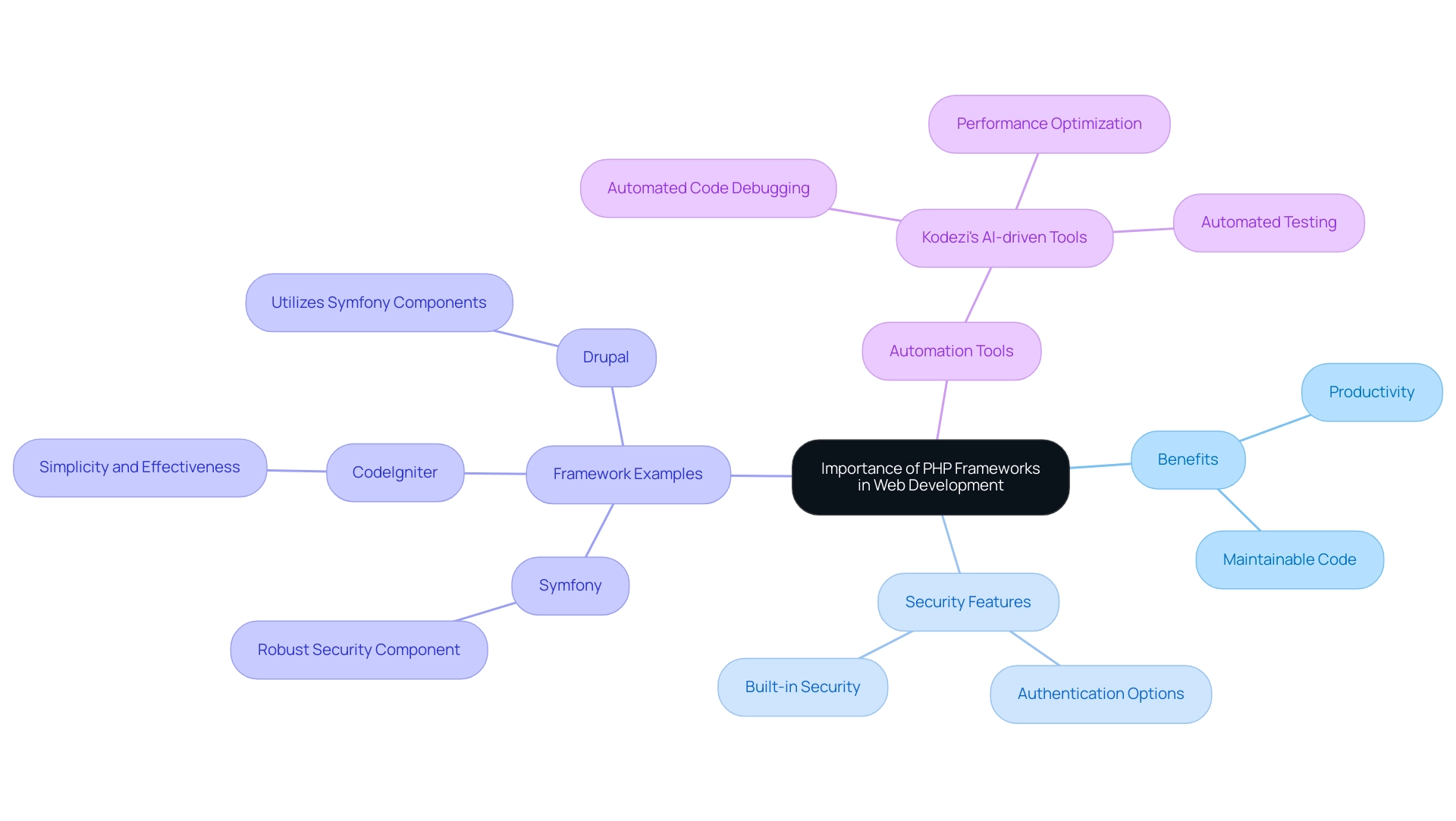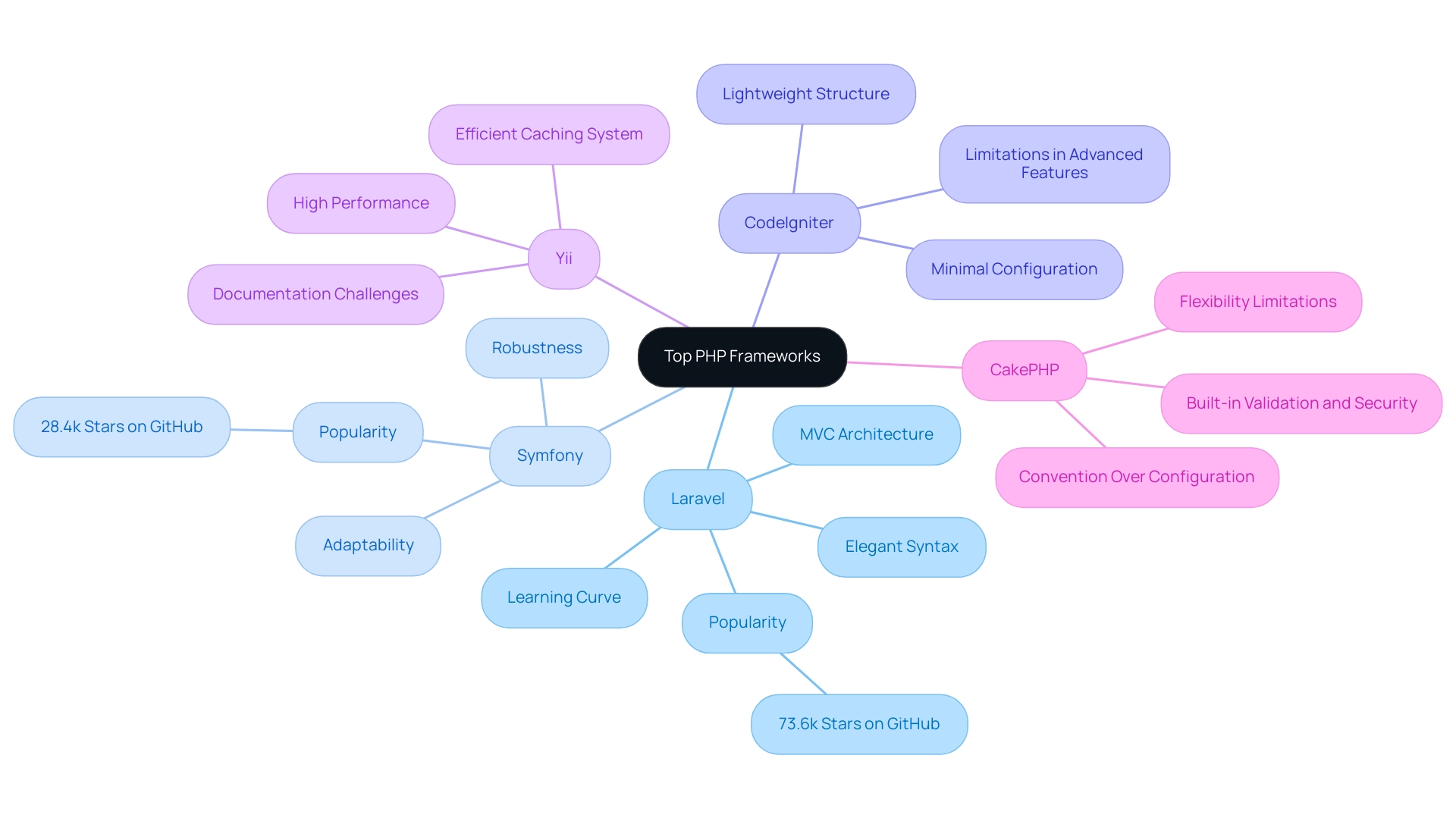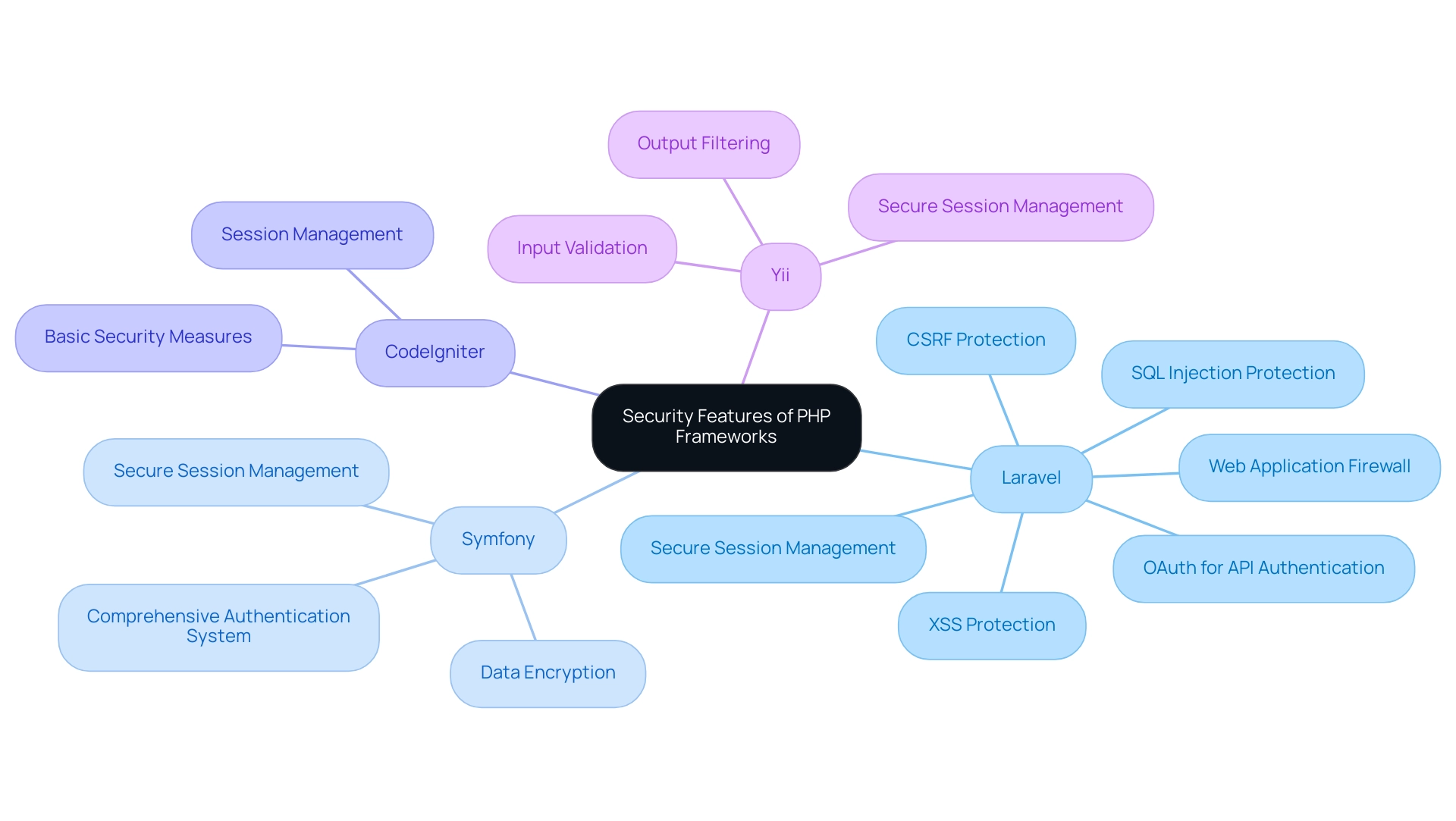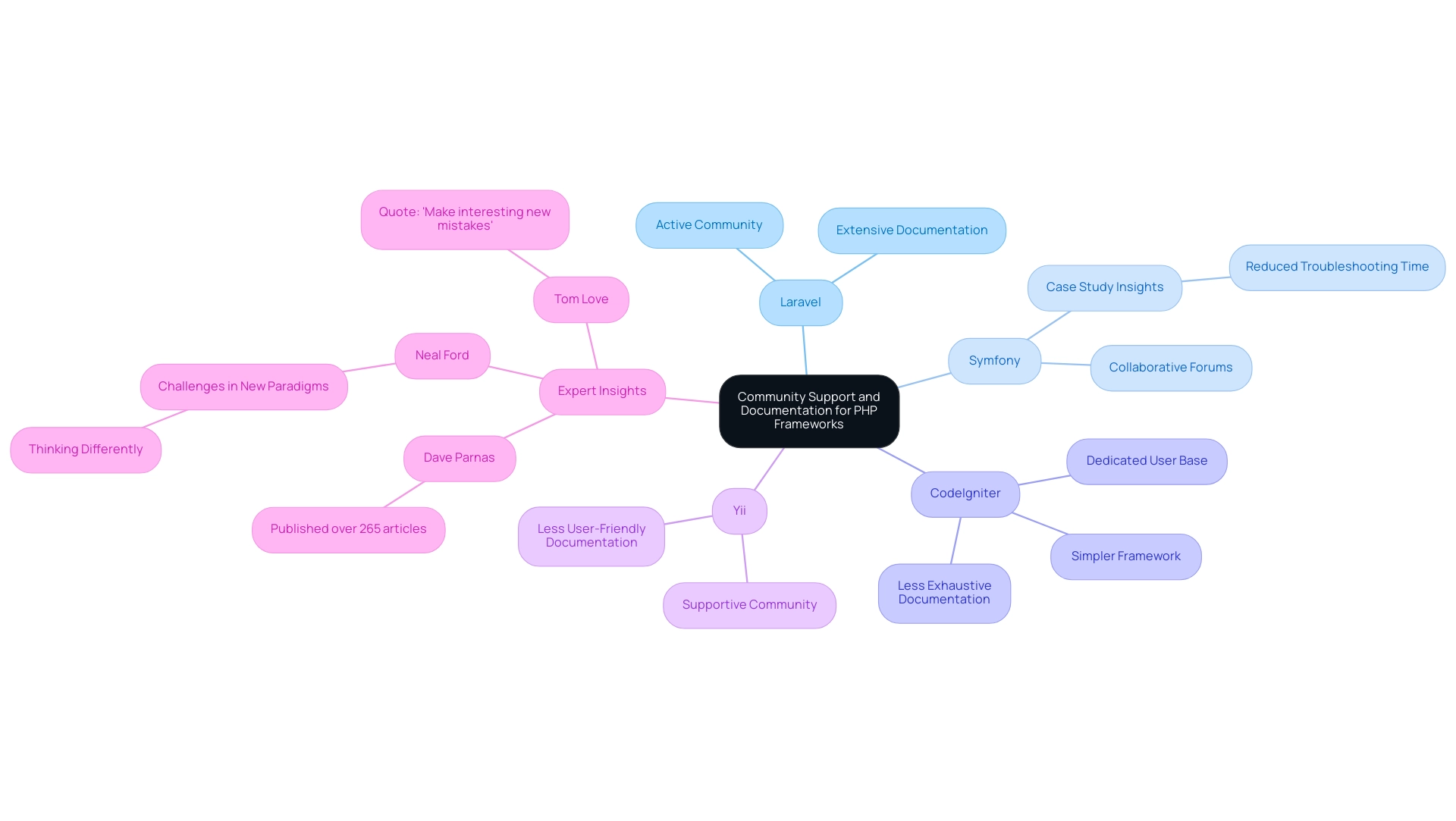Introduction
In the realm of web development, PHP frameworks have emerged as indispensable tools that streamline the creation of dynamic applications. By providing a structured environment filled with essential libraries and tools, these frameworks empower developers to enhance their productivity while adhering to best practices.
As the demand for secure and efficient web solutions grows, frameworks like Symfony and Laravel stand at the forefront, offering robust functionalities that cater to both complex and straightforward projects. Coupled with innovative tools such as Kodezi’s AI-driven automation, developers can tackle coding challenges with unprecedented speed and accuracy.
This article delves into the significance of PHP frameworks, exploring their unique features, performance metrics, security capabilities, and the vital role of community support, ultimately guiding developers toward making informed choices that elevate their projects to new heights.
The Importance of PHP Frameworks in Modern Web Development
PHP structures are vital in contemporary web development, as they exemplify the php best framework by providing organized settings that facilitate the rapid development of dynamic web solutions. By offering a comprehensive suite of tools and libraries, these frameworks assist programmers in reducing repetitive tasks, significantly enhancing productivity. They enforce best practices and coding standards, resulting in cleaner and more maintainable code.
A significant instance is a framework, whose security feature provides a strong system with a broad range of authentication and authorization choices, enabling developers to create secure systems with assurance. Furthermore, Kodezi’s AI-driven automated tools enhance this experience by providing automated code debugging, which works by analyzing code in real-time to identify and fix issues, as well as performance optimization that suggests improvements based on code execution patterns. This enables rapid issue resolution and adherence to security compliance.
Statistics show that Drupal utilizes Symfony components to provide a robust foundation for its modules, underscoring Symfony's viability in the enterprise domain. Additionally, structures typically incorporate built-in security features that protect against common vulnerabilities, reinforcing their importance in safeguarding applications. As creators utilize these systems in conjunction with Kodezi's features, such as automated testing that identifies issues before they escalate, they can focus on the distinct elements of their projects rather than the foundational infrastructure, enabling quicker deployment and improving overall project efficiency.
The case study of CodeIgniter exemplifies this trend; its lightweight nature and effectiveness make it an ideal choice for programmers seeking simplicity without compromising power, establishing it as a contender for the php best framework in contemporary web development practices. As the landscape evolves, the integration of frontend technologies and the influence of AI will further shape the utility and functionality of PHP systems, driving innovation and improving developer productivity through seamless automation and tooling. Kodezi's tools not only simplify the development process but also improve the functionalities of systems like CodeIgniter, making them even more robust for contemporary web applications.

A Comprehensive Review of the Top PHP Frameworks
- Laravel: Celebrated for its elegant syntax and robust functionality, Laravel streamlines essential tasks like authentication, routing, and caching. Backed by the MVC architecture and its powerful Object-Relational Mapping (ORM) system called Eloquent, this framework ensures smooth database interactions. With a notable 73.6k stars on GitHub, Laravel's popularity reflects its strong standing in the PHP community. Despite its many advantages, the learning curve can be steep for newcomers, making hands-on experimentation crucial to unlocking its full potential. As Brian Dainis, CEO at Curotec, states, "The best way to truly understand the capabilities and synergies of Laravel is to experiment with it in various projects."
- This framework, celebrated for its adaptability, is designed for extensive projects. It boasts reusable PHP components and adheres to industry best practices, making it a preferred choice for complex projects. With 28.4k stars on GitHub, Symfony also enjoys a strong reputation among programmers. However, its extensive capabilities may pose challenges for smaller systems, where simplicity is often favored.
- CodeIgniter: As a lightweight structure, CodeIgniter is perfect for programmers looking for a simple solution without unnecessary bloat. Its minimal configuration requirements facilitate quick setups, enabling rapid development. However, developers may find it lacking some advanced features available in more robust frameworks, which could limit its use in complex systems.
- Yii: Recognized for its speed, Yii excels in creating high-performance web solutions. It incorporates an efficient caching system and supports AJAX, catering to modern web software demands. The trade-off lies in its documentation, which can be less comprehensive compared to other systems, potentially hindering the onboarding process for new programmers.
- CakePHP: This structure champions the principle of convention over configuration, allowing developers to build applications swiftly. With built-in validation and security features, CakePHP accelerates development time. However, its flexibility may not match that of its competitors, posing limitations for projects requiring extensive customization.
In conclusion, the PHP best framework presents distinct advantages and challenges compared to other PHP structures. The selection of structure should align with the specific project requirements, including scalability, performance, and the development team's familiarity with the php best framework. As highlighted in the case study "Key Takeaways on Laravel vs. Symfony," Laravel is user-friendly and fast, suitable for rapid development, while Symfony provides a stable architecture for complex applications.
Comprehending these structures' unique traits is essential for maximizing efficiency and achieving optimal project outcomes.

Comparing Framework Performance and Scalability
When assessing PHP structures, the php best framework is essential for ensuring performance and scalability, which greatly affect development results.
- Laravel, while celebrated for its extensive features, may exhibit slower performance under high traffic conditions compared to lighter frameworks like CodeIgniter.
- In contrast, Yii is specifically crafted for performance enhancement, effectively managing large-scale systems through advanced caching mechanisms.
The framework stands out with its modular architecture, which allows developers to tailor their projects by adding or removing components as needed, thus enhancing scalability. Recent performance benchmarks indicate that tools like Laravel and Symfony are feature-rich and suitable for diverse web projects, with Laravel favored for rapid development and Symfony preferred for complex applications. Testing on Windows has demonstrated good performance with databases over 50GB and even up to 160GB, emphasizing the capabilities of these systems in managing substantial data loads.
However, it is essential to consider potential limitations; as one expert noted, 'I think the main complaints about SQLite scaling is: Single process write. No mirroring. No replication.'
This perspective highlights the significance of choosing the php best framework, which not only satisfies current project needs but also supports expected future expansion. Additionally, a case study comparing the performance of a 5GB SQLite database with the same dataset in PostgreSQL revealed that while both systems performed similarly for complex queries, the user ultimately chose PostgreSQL for its advanced features like regex access and better indexing capabilities. This strengthens the idea that the choice of the php best framework should ensure the capacity to manage increased loads without compromising performance.
Security Features of PHP Frameworks
Security remains a paramount concern in web development, and leading PHP frameworks address this issue through a variety of built-in features designed to protect systems against vulnerabilities. Laravel stands out with advanced security measures that include robust protection against:
- SQL injection
- Cross-site request forgery (CSRF)
- Cross-site scripting (XSS) attacks
Its implementation of OAuth for secure API authentication and a web firewall exemplifies its commitment to security.
Symfony complements this with a comprehensive authentication system and data encryption capabilities, ensuring that sensitive information remains protected. Although CodeIgniter provides a more straightforward strategy, it still includes essential security measures, making it a viable choice for smaller projects. Yii distinguishes itself with powerful security functionalities, such as thorough input validation and output filtering, which are critical in defending against common web threats.
Furthermore, PHP frameworks typically offer secure session management capabilities that prevent session hijacking and fixation attacks, providing session encryption and automatic expiration. A recent analysis highlights that there were 17 contributions on scaling and deploying Lumen microservices across different platforms, emphasizing the significance of security in scalable systems. As James Kenny, a web creator at RapidMod.io, aptly notes,
We know that other languages, such as Node.js, are also able to mitigate security risks; they often come with added complexity and layers.
This contrast highlights the significance of choosing the PHP best framework that has robust security features to safeguard applications against a constantly changing array of threats and vulnerabilities.

Community Support and Documentation
Community support and documentation are pivotal in shaping a programmer's experience with PHP frameworks. Laravel stands out with its vibrant and active community, offering extensive documentation that includes tutorials and forums for problem-solving, enhancing programmer efficiency. The framework also presents a robust community and provides comprehensive documentation covering advanced topics, which is critical for tackling complex challenges.
For example, a case study on Symfony’s community support shows how collaborative forums have significantly reduced troubleshooting time for programmers. CodeIgniter, while simpler and catering to those who prefer a lightweight solution, maintains a dedicated user base; however, its documentation may not be as exhaustive as that of its competitors. Yii, though backed by a supportive community, can present challenges with less user-friendly documentation.
The importance of community support is further emphasized by the extensive contributions from industry experts, as evidenced by Dave Parnas, who has published over 265 articles and reports on software development practices. The insights from Neal Ford underscore that the real challenge in adopting new programming paradigms lies in changing one's thought process rather than merely learning syntax. Moreover, as Tom Love wisely noted, 'The key to efficient development is to make interesting new mistakes.'
Consequently, selecting the best PHP framework that offers solid community support and clear documentation not only aids developers in overcoming hurdles more effectively but also significantly boosts their overall productivity.

Conclusion
The exploration of PHP frameworks reveals their crucial role in modern web development, providing structured environments that significantly enhance productivity and code maintainability. Frameworks like Laravel and Symfony stand out for their robust functionalities, catering to both simple and complex projects while ensuring best practices are followed. Their built-in security features safeguard applications against various vulnerabilities, making them indispensable tools for developers aiming to deliver secure web solutions.
Moreover, the integration of Kodezi’s AI-driven automation further amplifies the capabilities of these frameworks. By streamlining tasks such as automated code debugging and performance optimization, developers can focus on the unique aspects of their projects rather than getting bogged down by repetitive tasks. This synergy between frameworks and innovative tools not only speeds up the development process but also empowers teams to achieve higher standards of quality and efficiency.
Ultimately, choosing the right PHP framework, supported by strong community resources and comprehensive documentation, is essential for maximizing project outcomes. As the web development landscape continues to evolve, embracing these frameworks alongside advanced automation tools will ensure developers are well-equipped to meet the demands of an ever-changing digital environment, driving innovation and productivity to new heights.
Discover how Kodezi can transform your development process—try our AI-driven automation tools today!
Frequently Asked Questions
Why are PHP frameworks important in web development?
PHP frameworks are vital as they provide organized settings that facilitate the rapid development of dynamic web solutions, reduce repetitive tasks, enhance productivity, and enforce best practices and coding standards for cleaner, maintainable code.
What security features do PHP frameworks offer?
PHP frameworks typically incorporate built-in security features that protect against common vulnerabilities, including SQL injection, CSRF, and XSS attacks. They also provide authentication and authorization options, secure session management, and data encryption capabilities.
How does Kodezi enhance the development experience with PHP frameworks?
Kodezi offers AI-driven automated tools that provide real-time code debugging and performance optimization, enabling rapid issue resolution and adherence to security compliance, which enhances overall development efficiency.
What are some examples of popular PHP frameworks?
Popular PHP frameworks include: 1. Laravel: Known for its elegant syntax and robust functionality, ideal for rapid development. 2. Symfony: Celebrated for its adaptability and reusable components, suitable for extensive projects. 3. CodeIgniter: A lightweight framework that facilitates quick setups for simpler projects. 4. Yii: Recognized for high performance and efficient caching. 5. CakePHP: Focuses on convention over configuration, speeding up application development.
What are the performance considerations when choosing a PHP framework?
Performance can vary among frameworks; for instance, Laravel may perform slower under high traffic compared to lighter frameworks like CodeIgniter. Yii is designed for high performance, effectively managing large-scale systems through advanced caching.
How does community support impact the use of PHP frameworks?
Community support and documentation are crucial for a programmer's experience. Frameworks like Laravel provide extensive documentation and an active community, which enhances problem-solving efficiency, while others like CodeIgniter may have less exhaustive documentation.
What should developers consider when selecting a PHP framework?
Developers should consider project requirements such as scalability, performance, security features, community support, and documentation when selecting a PHP framework to ensure it meets current and future needs.




